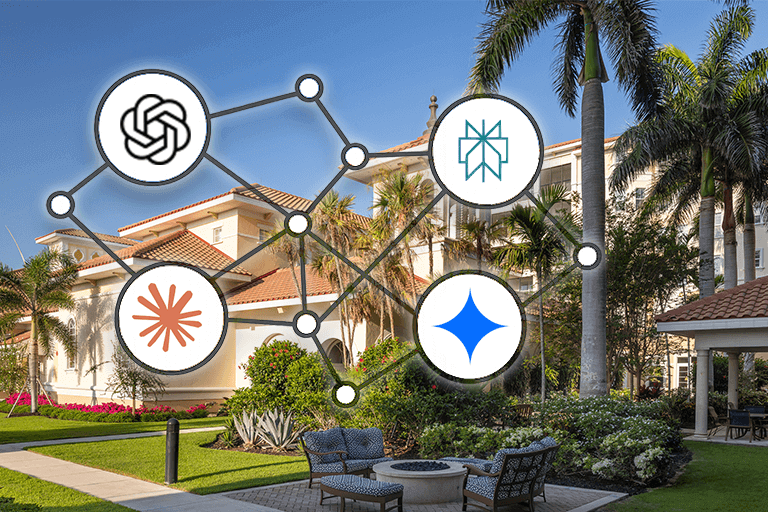Arc Intermedia was optimizing for AI-driven search before most agencies knew it mattered. Our early investment in decoding how large language models discover, interpret, and deliver information gives our clients an advantage.
Through continuous testing, advanced prompt and topic research, and deep analysis, we ensure our clients’ content is visible where audiences are asking questions and seeking answers. Arc’s pioneering expertise positions brands at the forefront of AI search, helping them capture relevance, authority, and attention in the new era of discovery.
Digital marketing is a business investment and must produce real returns. It’s what our clients expect. It’s what we deliver.
Client Revenues
Transactions & Leads
Website Visitors


AI search behaves differently from traditional SEO, so every program is customized around a brand’s industry, audience’s questions, and the signals answer engines rely on.
A typical AEO framework includes:
Assess client and competitor brand identities across the web
Understand current sentiments of client and your competitors brands
Evaluate existing on- and off-site optimizations and brand building tactics
Formulate a strategic plan to positively influence sentiment and build new brand references
Implement strategic optimizations and expansions on- and off-site
Train relevant parties on approaches to improve sentiment on social media and other external platforms
Create customized reporting for each client’s needs
Adjust and expand as needed to continuously improve

Call 610.347.5661 or fill out this form to get started.
AI search and answer engines use artificial intelligence (particularly large language models or LLMs) to provide direct, conversational answers instead of a simple list of links. They gather and synthesize information from many sources, then present it in natural language that feels more like a dialogue than a results page. Examples include ChatGPT, Perplexity, Gemini, Copilot, Claude, and more.
AI answer engines don’t simply crawl and rank pages like Google. They interpret information from across the web, analyze signals of trust and authority, and synthesize it into a single conversational response. This makes it essential for a brand to have strong, consistent, high-quality content on their own website and across external publishers, communities, and platforms.
Answer engine optimization (AEO) services are designed to increase a brand’s visibility within AI-powered search and answer engines. Instead of optimizing specifically for traditional search engine rankings on Google or Bing, these services focus on ensuring a brand is cited, referenced, and accurately represented in the natural-language answers generated by large language models (LLMs). AI search optimization typically includes:
SEO helps websites rank in traditional search results. AI search optimization focuses on feeding, influencing, and training large language models so they can surface brands in their answers. It requires different tactics including topic modeling, AI-friendly content creation, trust signal development, community participation, and external publisher partnerships.
No, AI isn’t replacing Google, but it is reshaping how people search. For the first time in years, Google faces real competition from AI-driven answer engines, and it has responded by incorporating its own AI tools directly into its search results. Rather than replacing Google, AI search is expanding the discovery ecosystem. Modern strategies must adapt by balancing traditional SEO with AI-focused content optimization, ensuring brands stay visible in both.
Because consumers are rapidly shifting toward AI tools for answers, research, and decision-making. While Google still dominates, AI platforms are increasingly influencing brand perception and purchase paths. If brands aren’t appearing in AI-generated answers, they’re losing early-stage visibility to competitors who are.
We measure AEO success by:
Yes. We specialize in making content easy for AI models to find, trust, and quote. That includes:
The goal is simple: when users ask AI engines about topics in this space, the brand is recognized and surfaced as a reliable source
Yes. External authority matters more than ever. AI engines rely on signals of credibility from trusted third-party sites, communities, and publishers. Arc identifies which external platforms influence LLM training data and help place authoritative content where AI tools are most likely to encounter and trust it.
They will, regularly. That’s why our AEO programs include proactive monitoring and rapid adjustment. We continually test outputs, evaluate shifts in answer composition, study emerging patterns in citations and references, and adapt strategies as engines evolve. Our clients’ visibility doesn’t fall behind because we stay ahead of algorithmic changes.
Everyone. Any organization that needs to be discovered, compared, or trusted online can benefit from AI search optimization. That said, we see the strongest impact in:
If an audience is asking questions online, AI tools are already shaping how they find answers. This makes AI search relevant across nearly every industry.
Timelines vary based on a brand’s current visibility, the strength of brand signals, and how competitive a space is. While some AI search improvements can happen more quickly than traditional SEO, AEO still requires time for models to recognize, interpret, and apply new information. Most clients begin seeing early signs of movement within 60–120 days, with stronger, compounding gains as consistent optimization reinforces brand visibility across AI engines.
Arc Intermedia began optimizing for AI-driven search before most agencies even recognized the shift. We’ve spent years testing, experimenting, and decoding how LLMs interpret and rank information. Our advantage comes from early investment, proprietary testing frameworks, platform partnerships, and hands-on experience across dozens of AI engines. That expertise translates directly into faster, more reliable results for our clients.
Answer Engine Optimization (AEO) is highly customized, but most businesses invest between $1,500 and $10,000+ per month, with smaller sites on the lower end and complex or enterprise sites toward the top. The exact cost depends on the specific site size, industry competition, content and technical needs, and how aggressive goals are, so request a no-obligation proposal for a tailored AEO quote.
Yes. Arc makes it easy for organizations to understand where they stand and what it will take to improve visibility. Arc offers free audits of AI search presence, customized quotes based on goals and budget, and reviews of current digital marketing efforts. There’s no obligation, just clear, practical recommendations that can be applied whether an organization chooses to work with Arc now or in the future.